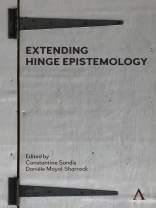Hinge Epistemology is rapidly becoming one of the most exciting areas of epistemology and Wittgenstein studies. In connecting these two fields it brings a revived energy to both, opening them up to fresh developments. The essays in this volume extend the subject in terms of both depth and breadth. They present new voices and challenges within hinge epistemology. They explore new applications and directions of hinge epistemology, particularly as it relates to the philosophy of mind, society, ethics, and the history of ideas.
Table des matières
Notes on Contributors; Acknowledgements; Introduction: Fastening the Hinges, Opening the Door; Part I Fastening the Hinges, Chapter One Wittgenstein’s Hinge Certainty, Danièle Moyal-Sharrock; Chapter Two Exploring Quasi-Fideism, Duncan Pritchard; Chapter Three Which Hinge Epistemology between Animal, Biscopic and Constitutivist? Annalisa Coliva; Chapter Four Something Animal, Something Unpredictable: On the Difficulty of Finding the Beginning and Not Trying to Go Further Back, Paul Standish; Chapter Five Closure-Based Scepticism and Epistemic Restrictions: A Dialectical Approach to Hinge Epistemology, Xavier Maréchal; Chapter Six ‘Hinges’ of Trust: Wittgenstein on the Other Minds Problem, Jasmin Trächtler; Part II Opening the Door, Chapter Seven Political Hinge Epistemology, Chris Ranalli; Chapter Eight Collective Thought and Collective Trust, Michel Le Du; Chapter Nine Deep Impact: Wittgenstein’s Enduring Enactivist Legacy, Victor Loughlin; Chapter Ten In Defence of a Reidian Moderate View of Our Hinge Commitments, Angélique Thébert; Chapter Eleven Consider the Squirrel: Hume as Hinge Epistemologist, Constantine Sandis; Index
A propos de l’auteur
Constantine Sandis is Founding Director of Lex Academic and Visiting Professor of Philosophy at the University of Hertfordshire
Danièle Moyal-Sharrock is professor of philosophy at the University of Hertfordshire and president of the British Wittgenstein Society.












